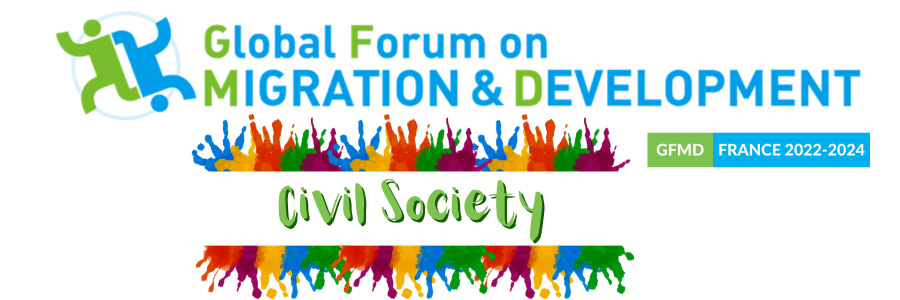Delegates take stock of achievements in 2020, highlight the value of the GFMD space for partnerships and dialogue, and focus on priorities for 2021.
The Closing Plenary of the 13th Global Forum on Migration and Development (GFMD) Summit took place on 26 January 2021. The Plenary agenda reflected on the Summit’s outcomes, looked back over the work of the GFMD in 2020 and set out plans and priorities for 2021.
Opening the plenary session, 2020 GFMD Chair H.E. Nasser bin Thani Juma Al Hamli, United Arab Emirates (UAE) Minister of Human Resources and Emiratisation, outlined the work of the GFMD throughout 2020 and thanked all those who had contributed to this year’s Summit. “The GFMD is a space for difficult discussions,” Al Hamli stated, “where we can focus on concrete outcomes, and come together in a spirit of trust and mutual exchange.” Referencing the UAE’s decision to make the full GFMD agenda open to all stakeholders, Al Hamli urged that “all future GFMD Chairs build on this significant success by retaining this approach.”
Al Hamli introduced the following four individuals and organizations that the UAE Chair wished to honor for their exceptional contributions to the GFMD:
- Ambassador Pietro Mona, Permanent Representative of Switzerland to the African Union and the Intergovernmental Authority on Development;
- Estrella Lajom, Head of the GFMD Support Unit;
- Madelaine Yorobe Alfelor, Mayor of Iriga City, Philippines (on behalf of the GFMD Mayors Mechanism); and
- Marta Verani, United Nations Major Group on Children and Youth (on behalf of Youth Participation).
Accepting his award, Mona emphasized the many contributions of the colleagues and organizations he had worked within the GFMD process, amongst others highlighting “the great support of those in the civil society community.” Verani acknowledged the “crucial support of our long-standing civil society partners in enabling us to facilitate the active participation of 100 young people in this year’s Summit.”
Lajom noted “the enduring success of the GFMD, which is our collective achievement,” but urged all stakeholders to work collectively to address the challenges faced by the GFMD and “ensure its continuity, which is our collective calling and responsibility.”
During reflections of the GFMD Mechanisms and roundtable discussions on the Summit’s thematic priorities, Helena Olea of Alianza Americas outlined the below joint Summit priorities developed during the GFMD Civil Society Preparatory Meeting, and urged their inclusion in GFMD programs and discussions going forward:
- Ensuring social protection for migrants and their access to services, regardless of their status and without the fear of arrest or deportation;
- Expanding migrants’ regularization and legal migration pathways, with a particular focus on decent work in all its dimensions, including freedom of association and the right of migrant workers to join trade unions;
- Fighting xenophobia and discrimination;
- Promoting due process and access to justice.
In a late addition to the agenda, Daniel McNicholas of the United States Permanent Mission to the United Nations in Geneva outlined a commitment from the United States (which withdrew from all international fora related to migration in 2017) to “work together to face common migration challenges, and find solutions that protect the human rights and dignity of all people.” Highlighting the GFMD as an opportunity for the United States to re-establish global relationships and alliances, McNicholas concluded by informing delegates that “we will undertake a review of our participation in the GFMD and other migration fora that support the Global Compact on Migration, we will be showing up, we will be listening, we will ask questions and we will be working closely with all of you.”
“The GFMD is a space for difficult discussions, where we can focus on concrete outcomes, and come together in a spirit of trust and mutual exchange.”
H.E. Nasser bin Thani Juma Al Hamli, 2020 GFMD Chair
Concluding the session, Ambassador Pascal Teixeira da Silva of the French Ministry of Europe and Foreign Affairs spoke on behalf of the future proposed 2022-23 French Chairmanship of the GFMD. He emphasized the importance of diaspora populations and organizations within French migration policy, as “major stakeholders in international development, with their ability to transfer expertise to countries of origin, and contribute to human relations between countries of origin and destination.”
Da Silva highlighted the impact of climate change on migration and development as a key priority topic for the GFMD going forward. He also highlighted “necessary reforms of the GFMD’s funding and governance to ensure that the Summit is ‘futureproofed,’” including the potential for some GFMD meetings to follow the example of 2020 and move online.
Da Silva concluded by proposing that France partner with a sub-Saharan State to form a “fruitful and inclusive GFMD co-Chairmanship in place until 2023.” He urged that the GFMD “preserve its role as a unique platform for exchange, dialogue and proposals, and bring a real added value both on current issues, and for issues that are gaining ground – such as climate change – where the GFMD can also bring a major contribution.”
Closing the session, Al Hamli welcomed the French commitment to the 2022-23 GFMD co-Chairmanship. He concluded by informing delegates that “pending the appointment of a 2021-22 GFMD Chair, the United Arab Emirates will work together with the Troika and the Steering Group to put forward a program of reform and ensure a meaningful transition.”
Image based on a photo by Aaron Betts on Unsplash

